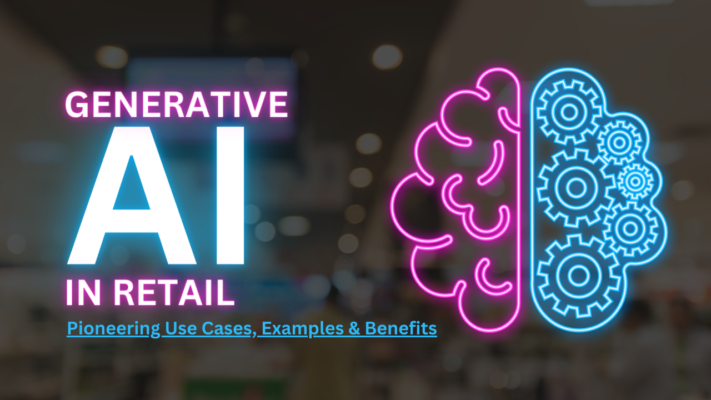
The retail industry is undergoing a seismic shift, and at the forefront of this transformation is generative AI. As a cutting-edge technology that enables the creation of novel and personalized content, generative AI is poised to reshape the way retailers engage with customers, streamline operations, and drive innovation. With its ability to generate realistic images, text, and even virtual experiences, generative AI holds immense potential to revolutionize the retail landscape.
The adoption of generative AI in retail is gaining momentum, as forward-thinking retailers recognize its transformative power. By leveraging generative AI solutions, retailers can unlock new levels of personalization, automate content creation, optimize inventory management, and create immersive customer experiences. The possibilities are vast, and the impact on the retail industry is expected to be profound.
In this blog post, we will take a deep dive into the world of generative AI in retail. We will explore the fundamentals of generative AI, its transformative potential for the retail industry, and real-world examples of retailers already leveraging this technology to great success. We will also discuss the benefits and challenges associated with generative AI adoption, as well as insights from industry leaders and research on the future of retail in the age of AI.
What is Generative AI in Retail?
Generative AI refers to artificial intelligence algorithms and models capable of creating new, original content such as images, text, audio, and even video. Unlike traditional AI systems that are designed for tasks like classification or prediction, generative AI focuses on generating novel outputs based on learned patterns and representations from training data.
In the context of retail, generative AI has immense potential to transform various aspects of the industry. From personalized product recommendations and virtual try-on experiences to automated content creation and inventory optimization, generative AI in retail is set to reshape how retailers interact with customers and streamline their operations.
Benefits of Generative AI for the Retail Industry
The adoption of generative AI in retail brings forth a multitude of benefits that can significantly enhance the retail experience for both customers and businesses. Here are some key benefits of generative AI for the retail industry:
1. Personalized Customer Experiences: Generative AI enables retailers to create highly personalized experiences for their customers. By leveraging customer data and preferences, generative AI algorithms can generate tailored product recommendations, personalized marketing content, and even virtual try-on experiences that cater to individual customer needs and desires.
2. Improved Customer Engagement: Generative AI can help retailers engage with customers in more interactive and immersive ways. For instance, generative AI-powered chatbots can provide personalized assistance, answer queries, and offer recommendations in real-time, enhancing customer satisfaction and engagement.
3. Efficient Content Creation: Creating high-quality product descriptions, ad copy, and marketing content can be time-consuming and resource-intensive. Generative AI can automate the content creation process, generating compelling and persuasive content at scale, saving retailers valuable time and effort.
4. Inventory Optimization: Generative AI can analyze sales data, customer preferences, and market trends to predict demand and optimize inventory management. By generating accurate demand forecasts, retailers can ensure they have the right products in stock, reducing overstocking and minimizing lost sales due to stockouts.
5. Enhanced Visual Merchandising: Generative AI can assist retailers in creating visually appealing product displays and store layouts. By analyzing customer behavior and preferences, generative AI can suggest optimal product placements, color combinations, and visual arrangements to maximize customer engagement and sales.
How Generative AI Will Change the Retail Industry
The impact of generative AI on the retail industry is expected to be profound and far-reaching. As generative AI solutions continue to advance and mature, they have the potential to revolutionize various aspects of the retail landscape:
1. Personalized Shopping Experiences: Generative AI will enable retailers to provide highly personalized shopping experiences tailored to individual customers. By leveraging customer data, generative AI algorithms can generate personalized product recommendations, virtual try-on experiences, and even customized products based on customer preferences and style.
2. Immersive and Interactive Experiences: Generative AI will transform the way customers interact with retailers, both online and in-store. Generative AI-powered virtual assistants and chatbots will provide personalized assistance, answer queries, and offer recommendations in real-time, creating more engaging and immersive shopping experiences.
3. Automated Content Creation: Generative AI will streamline the content creation process for retailers. From generating product descriptions and ad copy to creating personalized email campaigns and social media posts, generative AI will enable retailers to produce high-quality content at scale, saving time and resources while ensuring consistency and relevance.
4. Efficient Inventory Management: Generative AI will revolutionize inventory management in retail. By analyzing sales data, customer preferences, and market trends, generative AI algorithms can generate accurate demand forecasts, enabling retailers to optimize their inventory levels, reduce waste, and minimize stockouts.
5. Enhanced Visual Merchandising: Generative AI will assist retailers in creating visually appealing and engaging store layouts and product displays. By analyzing customer behavior, preferences, and sales data, generative AI can suggest optimal product placements, color combinations, and visual arrangements to maximize customer engagement and drive sales.
How Retailers Can Take Advantage of Generative AI
To stay competitive in the rapidly evolving retail landscape, retailers must embrace generative AI and leverage its potential to transform their operations and customer experiences. Here are some ways retailers can take advantage of generative AI:
1. Invest in Generative AI Solutions: Retailers should invest in generative AI solutions that align with their business goals and customer needs. This may involve partnering with AI consulting firms, such as Upcore Technologies, to develop customized generative AI applications tailored to their specific requirements.
2. Integrate Generative AI into Existing Systems: Retailers should integrate generative AI into their existing systems and processes to seamlessly incorporate its capabilities. This may involve integrating generative AI with customer relationship management (CRM) systems, inventory management systems, and e-commerce platforms to enable personalized experiences and streamlined operations.
3. Leverage Customer Data: To fully harness the power of generative AI, retailers must leverage customer data effectively. By collecting and analyzing customer preferences, behavior, and purchase history, retailers can train generative AI models to generate personalized recommendations, content, and experiences that resonate with individual customers.
4. Embrace Automation: Generative AI enables retailers to automate various tasks, such as content creation, inventory management, and customer support. By embracing automation, retailers can streamline their operations, reduce costs, and free up resources to focus on strategic initiatives and customer engagement.
5. Continuously Optimize and Refine: Generative AI is an iterative process that requires continuous optimization and refinement. Retailers should regularly monitor the performance of their generative AI solutions, gather customer feedback, and make necessary adjustments to improve the accuracy, relevance, and effectiveness of the generated outputs.
The Drawbacks of Generative AI for Retailers
While generative AI offers numerous benefits for retailers, it is essential to be aware of potential drawbacks and challenges associated with its adoption:
1. Data Privacy and Security Concerns: Generative AI relies heavily on customer data to generate personalized experiences and recommendations. Retailers must ensure robust data privacy and security measures are in place to protect sensitive customer information and comply with regulations such as GDPR and CCPA.
2. Bias and Fairness: Generative AI models can inadvertently inherit biases present in the training data, leading to unfair or discriminatory outputs. Retailers must be vigilant in detecting and mitigating bias in their generative AI systems to ensure fairness and avoid potential reputational damage.
3. Lack of Human Touch: While generative AI can automate various tasks and provide personalized experiences, it may lack the human touch and empathy that some customers value. Retailers must strike a balance between automation and human interaction to ensure a seamless and satisfying customer experience.
4. Implementation Challenges: Implementing generative AI solutions can be complex and resource-intensive. Retailers may face challenges related to data integration, infrastructure requirements, and talent acquisition. Partnering with experienced AI consulting firms like Upcore Technologies can help retailers navigate these challenges and ensure successful implementation.
5. Continuous Monitoring and Maintenance: Generative AI models require ongoing monitoring and maintenance to ensure their accuracy and relevance. Retailers must allocate resources for regular updates, retraining, and performance optimization to keep their generative AI solutions effective and up-to-date.
Generative AI Retail Examples
Several retailers have already begun leveraging generative AI to transform their operations and enhance customer experiences. Here are some notable examples of generative AI in retail:
1. Stitch Fix: Stitch Fix, an online personal styling service, uses generative AI to create personalized outfit recommendations for its customers. By analyzing customer preferences, style profiles, and feedback, Stitch Fix’s generative AI algorithms generate tailored clothing combinations that match individual tastes and sizes.
2. Sephora: Sephora, a leading beauty retailer, employs generative AI to provide personalized product recommendations and virtual try-on experiences. Through its Virtual Artist app, Sephora uses generative AI to allow customers to virtually try on makeup products, experiment with different shades, and receive personalized recommendations based on their skin tone and preferences.
3. H&M: H&M, a global fashion retailer, leverages generative AI to create personalized clothing designs. By analyzing customer data, fashion trends, and designer input, H&M’s generative AI system generates unique clothing patterns and designs that cater to individual customer preferences and styles.
4. Amazon: Amazon, the e-commerce giant, utilizes generative AI in various aspects of its operations. From personalized product recommendations to automated product descriptions and ad copy, Amazon harnesses the power of generative AI to enhance customer experiences and streamline its vast product catalog.
Use Cases
Generative AI has numerous potential use cases in the retail industry. Here are some key areas where generative AI can be applied:
1. Personalized Product Recommendations: Generative AI can analyze customer data, purchase history, and browsing behavior to generate personalized product recommendations. By understanding individual preferences and tastes, generative AI algorithms can suggest products that are most likely to appeal to each customer, increasing the likelihood of conversion and customer satisfaction.
2. Virtual Try-On Experiences: Generative AI can enable virtual try-on experiences for customers, allowing them to visualize how clothing, accessories, or makeup products would look on them without physically trying them on. By generating realistic virtual representations, generative AI can enhance the online shopping experience and reduce product returns.
3. Automated Content Creation: Generative AI can automate the creation of product descriptions, ad copy, and marketing content. By analyzing product attributes, customer preferences, and historical data, generative AI algorithms can generate compelling and persuasive content that resonates with target audiences, saving time and effort for retailers.
4. Inventory Optimization: Generative AI can assist retailers in optimizing their inventory management. By analyzing sales data, customer demand, and market trends, generative AI models can generate accurate demand forecasts, helping retailers make informed decisions about stock levels, replenishment, and allocation.
5. Visual Merchandising: Generative AI can revolutionize visual merchandising in retail. By analyzing customer behavior, preferences, and sales data, generative AI algorithms can suggest optimal product placements, color combinations, and store layouts that maximize customer engagement and drive sales.
Insights from Industry Leaders and Research
Industry leaders and research firms have recognized the transformative potential of generative AI in retail. Here are some insights and predictions from top experts:
1. Gartner: According to Gartner, a leading research and advisory firm, generative AI will drive significant innovation and disruption in the retail industry. They predict that by 2025, 30% of outbound marketing messages from large organizations will be synthetically generated, and 50% of all digital content will be created using AI.
2. McKinsey & Company: A report by McKinsey & Company highlights the potential of generative AI to transform the retail value chain. They emphasize that generative AI can enable personalized customer experiences, optimize inventory management, and streamline content creation, leading to increased efficiency and revenue growth.
3. Deloitte: Deloitte, a global consulting firm, predicts that generative AI will be a key driver of digital transformation in the retail industry. They suggest that retailers who embrace generative AI solutions will gain a competitive edge by delivering personalized experiences, optimizing operations, and driving innovation.
4. Capgemini: A survey conducted by Capgemini revealed that 74% of retailers believe AI will become a “must-have” for their organization within the next two years. The survey also highlighted that retailers expect AI to have a significant impact on customer experience, operational efficiency, and revenue growth.
Conclusion
Generative AI in retail is set to revolutionize the industry, transforming how retailers operate, engage with customers, and drive growth. From personalized experiences and automated content creation to inventory optimization and visual merchandising, generative AI offers a multitude of benefits and use cases for retailers.
However, to successfully harness the power of generative AI, retailers must navigate challenges such as data privacy, bias mitigation, and implementation complexities. Partnering with experienced AI consulting firms like Upcore Technologies can help retailers overcome these hurdles and unlock the full potential of generative AI solutions.
As the retail industry continues to evolve, embracing generative AI will be crucial for retailers to stay competitive, meet changing customer expectations, and drive innovation. By investing in generative AI solutions, leveraging customer data, and continuously optimizing their AI strategies, retailers can position themselves at the forefront of the digital transformation trends shaping the future of retail.
At Upcore Technologies, we are committed to helping retailers navigate the generative AI landscape and harness its transformative potential. With our expertise in AI consulting, RPA services, machine learning , computer vision services, and predictive analytics, we empower retailers to overcome digital transformation challenges and thrive in the age of generative AI.


